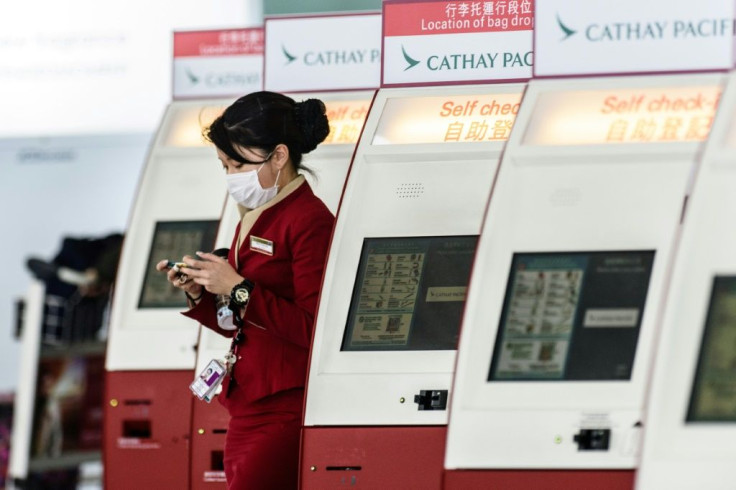Coronavirus Update: Cathay Pacific Airways Cuts Capacity 30%, Asks Workers To Take Unpaid Leave

KEY POINTS
- Cathay Pacific will cut total capacity by 30%
- Cathay Pacific will reduce 90% of flights to mainland China
- The airline took similar measures during the 2009 recession and 2003 SARS epidemic
Hong Kong’s flag carrier Cathay Pacific Airways has asked its 27,000 workers to take unpaid leave for three weeks as the airline deals with plunging demand amid the coronavirus outbreak.
Cathay Pacific’s CEO Augustus Tang pleaded with his employees in a video message on Wednesday, citing the current virus crisis is “just as grave” a situation as the global recession from ten years ago.
Cathay Pacific employees can take the leave option anytime between March 1 to June 30. Tang urged all tiers of the workforce to take the leave, including its “senior leaders.”
Cathay Pacific has also asked its suppliers to cut their prices, established a hiring freeze, halted “non-critical” spending and postponed some major projects as it deals with the fallout from the virus.
The number of passengers flying on Cathay Pacific has reportedly plunged by up to 50% in recent days.
“This has been one of the most difficult Chinese New Year holidays we have ever had,” Tang said in the video. “We don’t know how long this will last. With such an uncertain outlook preserving our cash is now the key to protecting our business. All of us need to respond to this rapidly changing and challenging environment.”
Cathay Pacific has eliminated 90% of its flights to mainland China. On Tuesday, the carrier said it will reduce about 30% of its total capacity over the next two months.
"In view of the novel coronavirus outbreak and also significant drop in market demand, we just announced massive capacity cuts,’ Cathay Pacific state.
The airline took similar measures during the 2009 financial crisis and in 2003 during the outbreak of severe acute respiratory syndrome, or SARS.
“We had the overwhelming support of our employees,” Tang said, referring to the 2009 episode. “It made an enormous difference. The situation now is just as grave and I ask for the same commitment to the future from you.”
The unpaid leave option is not mandatory.
Even before the coronavirus struck, Cathay Pacific already suffered lowered demand from last summer due to violent anti-government protests in Hong Kong.
“While mainland China is no doubt in the worst situation at the moment, Hong Kong is dealing with the coronavirus outbreak right after they’ve had huge issues with protests, so suffice to say the airline is in a challenging position,” wrote Ben Schlappig, a travel consultant. “Greatly cutting capacity over the coming months is a no-brainer, and unfortunately unpaid employee leave to go along with it makes sense. It’s anyone’s guess how this coronavirus situation will unfold, so presumably odds are good that these cancelations may be extended.”
Shortly after Tang’s video was released, Hong Kong leader Carrie Lam said any visitors from mainland China would be placed in compulsory quarantine for 14 days.
The virus has killed almost 500 people an infected more than 24,000 in China. Hong Kong reported its first death from the infection on Tuesday while at least 12 people have been infected.
Analysts at Jefferies analysts predicted that Cathay Pacific will report a loss in the first half of 2020 before returning to a profit in the second half, assuming flight demands rebounds.
Henry Harteveldt, principal at Atmosphere Research, a U.S.-based travel analysis firm, predicted the capacity reductions will lead to financial losses at Cathay Pacific.
“If an airline has a heavy presence in China, they are going to be [grounding] a lot of very expensive airplanes,” he said. “It is definitely going to cut into their financial performance.”
Ivan Su, equities analyst at financial services firm Morningstar, said: “It seems that the damages continue to widen for Cathay. In absolute terms, the revenue loss will probably be higher than those booked during SARS, primarily because Cathay’s business has [since] more than tripled in size.”
However, in a statement to the Hong Kong Stock Exchange, the airline sounded optimistic. “Cathay Pacific’s current financial position remains strong and will enable it, despite the current difficult trading conditions, to maintain the quality of its products and services,” the carrier stated.
© Copyright IBTimes 2024. All rights reserved.




















